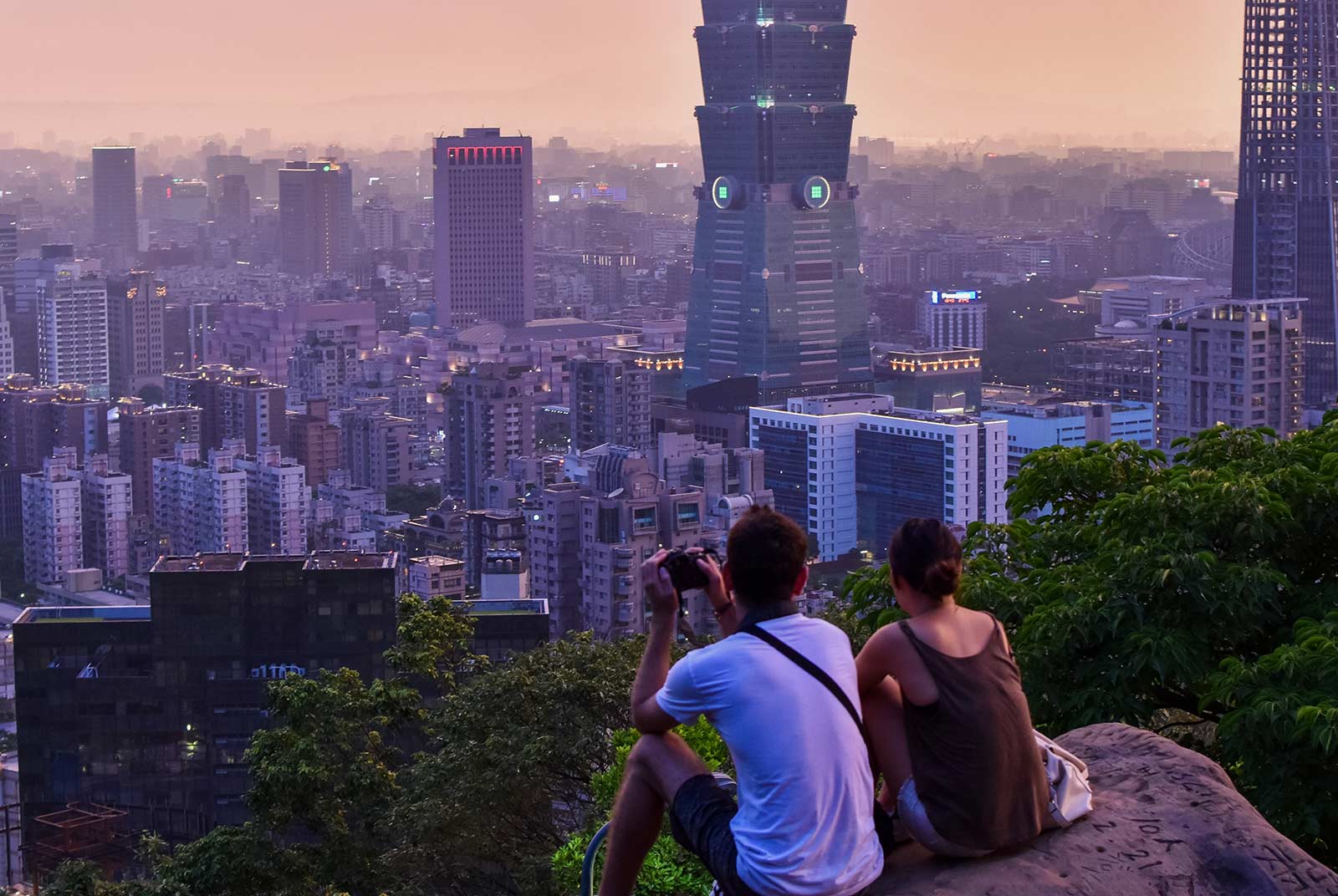Taitung, the Globetrotting Ironman and Surfer’s Shangri-La

Source:The 2018 Taiwan International Balloon Festival, photo courtesy of Taitung County Government)
Surf’s up! On the coast of Taitung, the surf breaks range in difficulty from beginner to high-intermediate. In recent years, surfers around the world have made their way here, especially those from Japan, Korea, and Hong Kong.
Views
Taitung, the Globetrotting Ironman and Surfer’s Shangri-La
By Sunny WuFrom CommonWealth Magazine (vol. 675 )
Located on the southeastern flank of Taiwan, Taitung is cut off from the rest of the island by the Central Mountain Range, therefore it has retained its pristine natural environment.
The local government has made good use of the city’s reclusiveness to develop a unique brand of sports tourism. The year-round itinerary of games and events has attracted athletes from all over the globe. Their combined market value is five times that of Taiwanese athletes, and it provides Taitung with a hefty sum of international tourism revenue.
Around here, there is no such thing as an off-season for tourism. Twelve months a year, hustle and bustle dominate the earth, sea, even sky.
With a landmass that’s ten percent of all Taiwan, this is the third largest county in the country.
Its 176-kilometer coastline embraces the Pacific Ocean to the east. To the west, the Central Mountain Range is rich with scenic valleys and winding crevasses. To the southeast, it commands Orchid Island and Green Island, two gorgeous islets just a boat ride from the seashore.
This is Taitung.
Every year from March to May, athletes competing in the Ironman Triathlon congregate around the Flowing Lake (活水湖). During the hot summer days from June to August, colorful hot air balloons from the world over hover in the sky above Luye Highland (鹿野高台). And in November and December, when the northeast monsoon roils the sea, the waves begin cresting higher and higher—it’s surf season.
The difficulty of travelling to this hinterland of Taiwan has turned Taitung into a reclusive haven, like a lonely island within an island nation.
“The transportation cost alone has stopped investment in Taitung’s tourism from the private sector. What’s more, tourist attractions in the past tended to feel like mere formalities, a flash in the pan. There was nothing unique to keep the visitors’ attention,” says Wang Kuo-cheng (王國政), Deputy Director of the Taitung County Tourism Department.
This was the classic conundrum: how to turn a crisis into an opportunity, a disadvantage into an advantage?
Combining Sports with Tourism
Flash back to ten years ago, when then County Magistrate Justin Huang (黃健庭) surveyed the geographical situation of Taitung and thought, what type of niche industries will find an advantage here?
At the time, no other county in Taiwan focused on nautical tourism, and tourism in the sky was virtually unheard-of.
In contrast, the coast of Taitung has ten excellent surf spots, something no other county could compete with. The Flowing Lake, an artificial lake built by former County Magistrate Chen Chien-nien (陳建年), is expansive enough to host large-scale water sports games. The sparse population of only around 220 thousand people makes it easy to manage traffic and other affairs during major sporting events.
A successful sporting event could attract thousands of visitors. But not all games are suited for sports tourism.
It took multiple attempts for Taitung to discover its unique blend of “three-dimensional” sports tourism. Paragliding and hot air balloons in the sky; diving and surfing in the sea; cycling and the Ironman Triathlon on land. By transforming sports into the backbone of local industries, Taitung has become a global hotspot for sports tourism.
Professor Jian-Long Chen (陳建榮) of the Department of Leisure and Sport Management at the National Taipei University explains there are two categories of sports tourism: spectator sport, such as the Olympics and the Grand Slam tournaments; and participatory sport, where amateur athletes could sign up if they’re interested, such as marathon and diving. Taitung has an advantage when it comes to developing the latter.
Unlike regular tourism, participants of sports tourism have an entourage: coaches, medics, family and friends. This greatly multiplied the number of visitors.
Participants tend to arrive early to familiarize themselves with the environs. This extended the length of their stay. A longer visit is also more attractive to international tourists.
A big event requires lots of preparation and longstanding commitment. Its success is reflected in the tally of visitors and their accommodations. According to the Taitung County Tourism Department, the visitor count increased to 7.75 million in 2018. From 2014 to 2018, the number of villas and hotels grew nearly three times, from 450 to 1,200.
Winston Shen (沈方正), CEO of the Hotel Royal Group, commends Taitung’s long-term vision of developing sports tourism. “They positioned the games as global affairs from the start. You must look beyond the domestic market when you host an event on a small island nation. The value generated by international visitors is five times more than domestic visitors.”
“The waves are a lot of fun in Taitung,” says Ibu (衣布), President of the Taitung County Surfing Association (台東縣衝浪運動推展協會). The diverse geography ranging from river mouths to coral reefs to sparkling beaches create a rich variety of surf breaks, guaranteed to satisfy any thrill-seeker’s need for an adrenaline fix.
 Taitung is the only place in Taiwan to be designated a world-class surf spot by the World Surf League (WSL). (Photo by Justin Wu/CW)
Taitung is the only place in Taiwan to be designated a world-class surf spot by the World Surf League (WSL). (Photo by Justin Wu/CW)
The Sea: A Surfing Paradise in a Class of Its Own
Besides being the leader of a successful hotel group, Winston Shen has been an avid surfer for the last decade. He describes the surf breaks on the coast of Taitung as the result of different types of geography. They range in difficulty from beginner to high-intermediate.
In recent years, he noticed an influx of foreign surfers, especially those from Japan, Korea, and Hong Kong.
Beginners usually come to try the waves in summer, while veterans enjoy challenging the swells in autumn and winter.
Domestic visitors and those from nearby countries stay for three to four nights on average. Surfers from Australia, Europe, and the Americas tend to stay longer—about one to two weeks.
The Low Pressure Surf & Guesthouse (熱帶低氣壓) run by Ibu, who is from the indigenous Bunun tribe, and her Japanese husband Shimizu Jun (清水淳), was the origin of the “Taiwan Open of Surfing” (台灣國際衝浪公開賽), an international surfing competition now entering its ninth year. They invited world-famous pro surfers Tetta Mori (森哲太) and Naofumi Zenke (善家尚史) to attend the contest. Ibu says, “As residents of sea-locked islands, we hope to improve people’s understanding of the ocean through natural and familiar ways.”
The County Government started from a supporting role, then eventually took over as the event organizer. The competition went from touring Asia to touring the entire world, from qualifying matches to championship matches. Everything got bigger and better.
As many as 5,000 visitors crowd into Taitung during the games. The matches are broadcasted online, garnering more than 36 million views from around the world.
Right now, Taitung is the only place in Taiwan to be designated a world-class surf spot by the World Surf League (WSL).
Rao Ching-ling (饒慶鈴), the current Magistrate of Taitung County, says surfing lessons can be provided between competitions to attract international visitors and raise awareness of this surfer’s paradise.
 The 2018 Taiwan International Balloon Festival. (Photo source: Taitung County Government)
The 2018 Taiwan International Balloon Festival. (Photo source: Taitung County Government)
The Sky: A Balloon Festival That’s Out of This World
Pan Kuei-lan (潘貴蘭), Chairperson of the Luminous Hot Spring Resort & Spa (鹿鳴溫泉酒店) in Taitung, remembers watching the hot balloon festival come into existence. At the time, the local government and private sector were brainstorming on ways to invent a unique and eye-catching international tourism event. Eventually, they raised their eyes to the sky, and so the first Taiwan International Balloon Festival was born in 2011.
Skyrainbow Airlines (天際航空) is a Taitung-based company that specializes in hot air balloon tours. Chairman Lin Yu-chen (林佑真) explains that the area between Chihshang Township in the north and Luye Township in the south is the only airspace in Taiwan where hot air balloons are permitted. For safety reasons, the government has also placed power lines and telephone wires in this region underground.
Taitung is uniquely suited to host hot air balloons due to its wide open spaces and lack of passing flights. Hot air balloons are already a common sight in this region even outside festival seasons.
Have you read?
♦ How did Taitung Nurture Its Urban Design Prowess?
♦ Taitung Uses Tourism to Save the Economy
♦ Join Artists in Taitung
Lin paints a picture with words: the East Rift Valley (花東縱谷) is beautifully scenic, with a carpet of greenery in spring and summer, fields of golden rice in autumn, and yellow clusters of rapeseed blossoms in winter. Riding on top of the world in a hot air balloon, the view is accentuated by a sea of clouds and the jutting peaks of the Central Mountain Range (中央山脈). You are basically floating above a visual poem.
During the festival, hot air balloons from fourteen to twenty countries come to join the fun.
Taiwanese hot air balloons also travel abroad to compete. In Canada, the Netherlands, Australia, Malaysia, the Philippines and other countries, hot air balloons representing Taitung, Taiwan can be seen riding the winds.
Last year, the Taiwan International Balloon Festival was recognized by Travel Channel, an American television channel owned by Discovery, Inc., as one of the twelve most amazing hot air balloon festivals in the world, and one of the twelve major hot air balloon events in the world.
Pan feels the festival has indirectly led to industrial restructuring in the region.
Luye Township, which was a sleepy farming community ten years ago, has now become a vibrant hub of tourism and leisure. Hotels, villas, agritourism farms, and restaurants have sprung up everywhere. Red oolong team from Luye has become one of the most famous souvenirs from Taitung.
Hot air balloons have done more than lift up Luye Township. Neighboring towns have benefited as well.
Angeline Lin (林瑜真), the Marketing & Public Relations Manager at Hotel Royal Chihpen (知本老爺酒店), says the hot air balloons’ evening night glow concerts that tour all over Taitung have also benefited the southern Zhiben (知本) area. Hotel deals which package festival tours with room reservations are often sold out instantly.
 Taitung is the stage for the international Ironman Triathlon points race. Every year, participants flock to Taitung to compete. (Photo source: Taitung County Government)
Taitung is the stage for the international Ironman Triathlon points race. Every year, participants flock to Taitung to compete. (Photo source: Taitung County Government)
The Earth: Where Globetrotting Ironmen Meet to Compete
Back on terra firma, two international Ironman competitions—IRON MAN 70.3 Taiwan and Challenge Taiwan—are held in Taitung.
This is the stage for an international points race. Every year, thousands of Ironmen from around the globe meet here to compete.
For two consecutive years, IRON MAN 70.3 Taiwan was voted “most likely to participate in again” by athletes around the world. Challenge Taiwan is the biggest Challenge Family event in the Asia-Pacific region. Its global ranking is only behind Challenge Roth in Germany.
Taitung was awarded “friendliest city” by the Asia-Pacific office of Challenge Family. Magistrate Rao says this is an example of how sports tourism connects her city with the world.
In order to attract more foreign visitors, Deputy Director Wang says there will be charter planes to Taitung from Ho Chi Minh City in July, and from Bangkok in October.
They are also surveying the port facilities and tourism resources of outlying islands, in hopes of working with Keelung, Kaohsiung, and the Matsu Islands to promote an island-hopping cruise trip. They plan to invite cruise lines to operate island-hopping trial tours next year.
In the past, the difficulty of travelling to Taitung was a hinderance. But limited access protected this area of Taiwan from overdevelopment and exploitation. Now Taitung enjoys all the natural advantages of an unspoiled paradise ideal for outdoor activities.
Stanley C. Yen (嚴長壽), Chairman of the Alliance Cultural Foundation (公益平台), says Taitung’s historical disadvantages have now become its greatest asset. “You see, the lack of investments in Taitung in the past is what makes this piece of earth pure.”
Globetrotting Ironmen come here in the spring to energize the earth with their vitality. Before the summer break, hot air balloons soar to the sky to paint the clouds with wonderful colors. Summer is the busiest season, when visitors flock to the beaches. But when the northeast monsoon comes in autumn and winter, the coastline vibrates with excitement as thrill-seeking surfers from every corner of the earth congregate to chase the waves.
Dear traveler, is your impression of Taitung still that tired old cliché: “beautiful mountains, beautiful water, boring stay and so very far away”?
Come see, the party here never stops, like a string of flowers blossoming in turn throughout the year.
When it comes to tourism in Taitung, there is no such thing as an off-season!
Translated by Jack C.
Edited by Sharon Tseng










